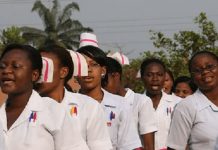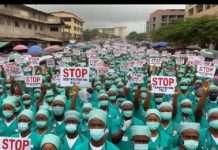The Federal Government of Nigeria recently directed the National Salaries, Wages and Incomes Commission (NSWIC) and the Presidential Committee on Salaries to formulate a new hazard allowance structure for healthcare workers. In this exclusive interview with TEMITOPE OBAYENDO, the newly elected President of the National Association of Nigeria Nurses and Midwives (NANNM), Comr. Michael E. Nnachi, states why nurses ought to be given priority consideration in the allocation formula. He also examined other crucial issues affecting the nursing profession in Nigeria, including use of technology, preparation for third wave of COVID-19, and NANNM’s relationship with UGONZA. Excerpts:

Congratulations once again as the newly elected President of NANNM. Please tell us what motivated you to contest for the position.
Thanks for congratulating me on my emergence as National President of NANNM in our last critical contest. I contested for the position because I felt strongly in my mind that when given the mandate I would certainly impact positively on the administration of our esteemed members by consolidating on the achievements of the outgoing leadership, which I was equally part of.
The decision was also driven by my wealth of experience in labour matters and human management, with shared feelings, needs, desires, and expectation of members over the years.
I have a deep concern on how to improve the conditions of service for members and to ensure better patient care outcomes, which is the purpose of the nursing profession. Poor conditions of service have led to many nurses and midwives leaving Nigeria for other countries, such as UK, Canada, Australia. This exodus of members to other countries in search of greener pastures depletes the existing workforce and increases workload on available manpower, especially when the governments at various levels are not employing annually to replace retired members.
Other expectations include but not limited to ratification of the contentious scheme of service for nurses and midwives, especially proper placement of nurse graduates and intern nurses as their counterparts in the health sector.
Equally important is the need to address critical issues of internal rivalry and unhealthy challenges faced by the nursing profession. Internal collaboration with other stakeholders, including NMCN, WACN, UGONSA, FHI, academia, specialist groups, as well as active participation of members, will no doubt reduce internal friction and enhance progress.
Surely, you would have held some positions prior to this time. Could you tell us about them?
Experience counts in any area of human endeavour. This is underscored by the saying that “experience is the best teacher”. NANNM administration is an institution of learning as it has much to do with human management and labour matters.
I am a bona fide and active member of NANNM and have diligently served at the unit, state, and national levels. I served as a unit secretary, state vice chairman, state chairman and national financial secretary, before emerging as president of the association. I have a strong feeling and desire to improve on critical areas that will benefit members, as well as a passion to achieve unity, peace and progress in the association.
Now that you have assumed office, what are your goals for the association?
Without mincing words, I will highlight my goals for the association as follows. One, to uphold the tenets of the NANNM constitution, as well as to serve within the confines of the objectives of the association, which include but not limited to organisation of members at all levels, including (private and public engaged nurses and midwives). Two, to passionately entrench/inculcate discipline, accountability, justice and fairness within and amongst members.
Three, to promote total professionalism and effective practice of professional code of ethics, which is what the nursing profession is known for. Four, to build a unique NANNM secretariat that will serve the entire nurses and midwives in Nigeria. Five, to collaborate with government, NMCN, WACN, and other critical stakeholders to achieve the best conditions of service for members.
The Federal Government is deliberating on a new hazard allowance for health workers. Considering the role of nurses in the system, how much would you propose to the government on behalf of nurses?
The nurses and midwives are at the epicentre of events, when one talks about exposure to hazard or risk. Due to the vulnerability of nurses and midwives, occasioned by their obligations to patients, they deserve nothing but the highest percentage of any consideration in terms of hazard allowance to health workers. 80 per cent of monthly consolidated basic salary is desirable.
From any perspective that one may look at the nurse and the patient, the nurse is the first contact during initial history taking and clerking, including assessment and recording of vital signs, which are fundamental to subsequent care and other consultations. The nurse assists in almost everything to ensure the patient’s survival, resuscitation and all forms of emergencies, including serving of medication.
Total physical and psychological care, as well as total human needs, revolves around the nurse. Others only meet the patient after the nurse must have promptly attended to him or her during the critical period. May patients often do not know this due to their critical condition. Nurses stay longer with patients during admission and always, which exposes the nurse to the risk of infection.
COVID-19 has revealed the essential roles of nurses. It has also shown that their practice is fraught with many challenges. Going forward, how can these challenges be tackled?
The essential roles of nurses and midwives cannot be overemphasized. Indeed, the health sector cannot succeed without the nurses and midwives, who remain the core frontline health workers at the epicentre. During the onslaught of the COVID-19 pandemic, lots of lives were lost in various health institutions. These included nurses and midwives, as well as other health professionals. The greatest challenge was inadequate supply of protective equipment to manage patients and limit spread.
The way forward is essentially for government to provide all health institutions with enabling working tools and improved conditions of service to protect the nurses and other health workers. Other steps include supporting the nurses and midwives to continue to deliver high-quality care to the populace; improving existing workforce through waivers for employment; paying due remuneration, palliative and hazard allowance; involving nurses and midwives in programmes and policies of government; providing adequate vaccine for the health workers and general public. There should also be teamwork with other relevant health workers and stakeholders. There should also be other considerations that will promote healthy working environment.
Discussion on leveraging technology for best patients’ outcomes is currently on the front burner in the healthcare sector. In what areas of nursing do you feel this can be applied?
Technology has a lot to offer nursing professionals in advancing patients outcomes. Technology significantly helps to contribute to patient-centred care by fostering communication between providers of care and patients through online portals, text messages, and e-mails, etc. It also promotes access to information, as in online medical records, which can improve self-monitoring and patients’ convenience.
Health information technology helps in storage and retrieval of data, and same promotes communication ability and easy flow of information. There is improved medication and decrease in medication errors with the use of technology.
The quantity of available data through health informatics provides more scientific information to work with, providing clear pictures of diseases, such as cancer and diabetes, as well as determining efficacy of drugs, imaging, scans, nursing practices and other tools and procedures used in patient care etc.
The third wave of COVID-19 is looming in Nigeria, with the recent surge in number of cases. Recalling the number of nurses that died during the first and second waves, what preparation is NANNM making in collaborating with the government for nurses’ safety?
Commendation to the Nigerian government which has placed six states on red alert regarding the COVID-19 third wave. The states, drawn from four of the country’s geopolitical zones of South-West, South-South, North-West, and North Central, are Lagos, Oyo, Rivers, Kaduna, Kano, Plateau, and the FCT.
The statement from the chairman of the Presidential Steering committee on COVID-19, Boss Mustapha, who doubles as the Secretary to the Government of the Federation (SGF), is reassuring and shows committed level of preparation to contain the menace.
Since the SGF has expressed deep concern and emphasis for all other states to show extreme preparedness, the nurses and midwives are prepared to work with government to ensure the containment of the spread of the third wave of COVID-19. We are ready to collaborate with government and any relevant agency to fight the spread of the pandemic.
The association and members will not relent on any approved measures by government to contain the spread of this deadly disease.
However, it is imperative for government to improve the supply of vaccine for the areas yet to be covered, while nurses remain passionate in effective delivery of healthcare service in Nigeria. We are prepared and willing to work with government and other stakeholders in the healthcare system.
It appears there is often disagreement between NANNM and graduate nurses under the umbrella of UGONSA. How do you intend to bridge the gap in relationship?
It is a negative perception for anyone to think there is disagreement between NANNM and graduate nurses under the umbrella of UGONSA. First of all, there is no disagreement at all. The leadership of NANNM has been in cordial relationship with UGONSA and all constitute nurses and midwives as NANNM members. There is effective collaboration between NANNM and UGONSA. The relationship is mature, healthy and cordial.
What is your message to all nurses in Nigeria?
I sincerely recognise all nurses and midwives as individual professional colleagues and members of NANNM, whose membership/contributions matter greatly. Through their active participation in NANNM activities and collaboration as a team/individual entity, we shall all achieve the best for NANNM and the nursing profession in Nigeria. Every nurse is as important as any other nurse.
I call for patience, peace, unity and understanding for us to achieve measurable achievements and progress in the near future. I plead that all nurses and midwives should recognise and make use of unit leadership, state leadership, zonal leadership, and national leadership, to address issues of importance or of a critical nature.
Our collective unity constitutes a force no one can break and with such, we can stand and achieve our collective dream. I appreciate NANNM leadership and members at all levels. United we stand , divided we fall.









